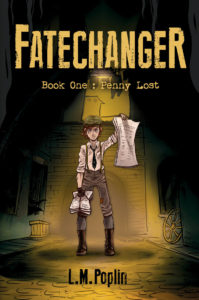Laura McCune-Poplin teaches writing and literature at Berklee College of Music in Boston. Her debut middle grade novel (as L. M. Poplin), Fatechanger, will be released this month.
 Book blurb: When fourteen-year-old Penelope Clark accidentally travels through time to 1915 Boston, she must disguise herself first as a pickpocket and then as a newsboy, learning how to thieve, fight, and broadcast headlines to survive in an era before antibiotics and open-heart surgeries.
Book blurb: When fourteen-year-old Penelope Clark accidentally travels through time to 1915 Boston, she must disguise herself first as a pickpocket and then as a newsboy, learning how to thieve, fight, and broadcast headlines to survive in an era before antibiotics and open-heart surgeries.
Stuck in the past with no way to get home, Penn makes her first friend ever, and many enemies. But when Penn is robbed, and the pickpockets kidnap the head newsboy, she finds herself stuck in the middle of a dangerous rivalry, questioning her loyalties to either side and to herself.
After a violent fistfight with a fellow pickpocket, Penn incurs a life-threatening infection. As her supposed enemy nurses her back to health—discovering she’s a girl and befriending her in the process—Penn realizes that someone else must have betrayed her. Her ensuing investigation reveals not only the truth of her betrayer’s identity but also her own.
Now that I’m mere weeks away from Fatechanger’s publication, I find myself wondering (or perhaps fearing) what people will think of my book. Will they like it? Will it bore them? Confuse them? Will they wonder why I used a penny as the mechanism to send Penn back in time? (And will they think her name, although deliberate, a little too cute?) Will they, like me, struggle to categorize the novel? Is it adventure? Sci-Fi? Historical? Middle Grade? Young Adult? Tween? Yes. Definitely tween. I have written a tween historical sci-fi adventure novel.
Perhaps the most important question, however, is the simplest one: will readers think that my book is good? This is the question that keeps me up at night. This is the question that haunts me, following me into the quiet moments of my day—riding on the T, perusing the aisles of the grocery store, walking past the lilacs on my way to pick up my son from school—transforming even the most benign event into an angst-filled one.
Yet despite my very sincere hope that children will commandeer flashlights to keep reading Fatechanger late into the night, I want my writing to be a different kind of good. The best kind. The kind full of wisdom that we’re told to seek out and learn from, by study and by faith.
Even when I was a little girl, devouring Nancy Drew books daily, I resisted the notion that “best books” could refer only to scripture. Since then, different Gospel Doctrine classes have attempted to identify “best books” for me, with varying and contradictory results. Fiction books often get short shrift because made-up stories by definition, are not true. (To anyone who shares a similar opinion, may I suggest a deeper study of the books of Esther and Daniel.) Other religious and cultural texts have also been frequently and quickly dismissed, erroneously confining wisdom to a limited worldview.
Yet despite the decades spent researching (happily and extensively, I might add) my own ideas about what makes for good reading, I still don’t have a concrete answer. It’s like “irony”—I can’t always define it, but I can almost always recognize it when I see it. Similarly, it would be difficult for me to make you a list of “best book” criteria, but when I’m reading, and my soul grows quiet, and I can feel my mind and my heart expanding, I know that the book I hold in my hand is of very great price.
To be honest, I don’t know that I’ve written a “best book”. But I do hope it’s a good one. I wrote Fatechanger for the teenager who hides behind the red velvet curtains in the cultural hall during Wednesday night Young Women’s activities because she has never quite fit in at church. Or at school. Or anywhere, really. I wrote Fatechanger for the child who likes to imagine living in a different time period, and sometimes wonders whether or not he would have been happier there. I wrote Fatechanger because I believe deeply in the dignity (defined by Donna Hicks as our inherent worth coupled with our inherent vulnerability) of all people. No one should ever feel invisible. We all deserve to be seen.
In the end then, despite my best efforts to avoid any concrete answers, maybe I’ve stumbled upon one unwittingly. Maybe in the recording of my thoughts I’ve refined them somewhat, because now, I do have a definition of sorts: a good book is one that teaches us of our self-worth, and helps us to recognize and honor the worth of others.
 Laura McCune-Poplin won the Dialogue New Voices Award for New Writers, Fiction: Excellence in Category in 2004 and her short stories took second and third place in the Irreantum Short Fiction Contests of 2011 and 2006. Her writing has appeared in Necessary Fiction, Dialogue, Irreantum, Nervy Girl, Exponent II, and in the short story anthology Dispensation: Latter-Day Fiction. She is currently working on the second book in the Fatechanger series. She has co-founded, with two of her favorite authors, L’ATELIER Writers—a non-profit literary retreat and workshop based in France. Find her at: www.lmpoplin.com.
Laura McCune-Poplin won the Dialogue New Voices Award for New Writers, Fiction: Excellence in Category in 2004 and her short stories took second and third place in the Irreantum Short Fiction Contests of 2011 and 2006. Her writing has appeared in Necessary Fiction, Dialogue, Irreantum, Nervy Girl, Exponent II, and in the short story anthology Dispensation: Latter-Day Fiction. She is currently working on the second book in the Fatechanger series. She has co-founded, with two of her favorite authors, L’ATELIER Writers—a non-profit literary retreat and workshop based in France. Find her at: www.lmpoplin.com.

Laura, I am super glad you are writing another book. I like your writing and enjoy and learn from your thinking and how expressive you are. I could almost heard you while I was reading this blog. Keep on writing. Don’t doubt yourself. You are great at all you do.